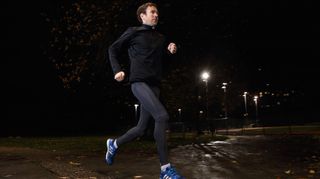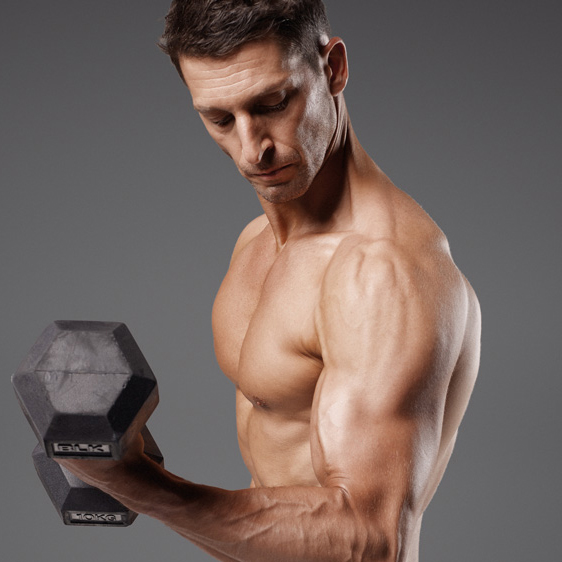How To Train Your Body To Run On Fat
If you’re running a marathon your body is going to have to dip into its fat stores. Here’s how to get better at it

Once you’ve signed up to run a long-distance race or event, as I have just done with the 2017 Virgin London Marathon for Parkinson’s UK, it’s tempting to focus all your efforts on your training plan. And that makes sense whether you’re a first-timer or a seasoned pro, because failing to get enough training miles in your legs before race day will make it hard – if not impossible – to get to the finish line with a smile on your face. After all, events are supposed to be fun.
But coming a very close second in your thoughts should be the food you eat and when to provide your muscles with the energy and nutrients needed to train hard and recover quickly. So if you’ve signed up for an endurance event but not given a second thought to your nutritional needs, now is the time to do so.
To get a better idea of what I – and you – need to know to fuel training effectively, I spoke to elite runner and coach Shaun Dixon (letsgetrunning.co.uk). He emphasises that nutrition should be a key part of your training plan throughout your preparation, not something you only think about the hours before race day. And he’s quick to point out that doesn’t just mean scoffing plates of pasta, rice and other carbs.
“When training for long-distance endurance events such as the London Marathon you want your body to become a lean, mean, fat-burning machine,” he says. “That’s because your body can only store enough energy, in the form of glycogen, to fuel the first 20 miles [32km] of a run. After this point, you’ll either have to take on extra calories in the form of gels or drinks, or rely on your body’s fat stores for the extra energy.”
What that means, he explains, is that it’s a good idea not to use energy gels or energy drinks during your training runs so that your body becomes more adept at tapping into fat cells to free up the energy stored there, which can then be used to power you through those final few miles to the finish line.
Run Hungry
Renee McGregor, a performance and clinical dietitian and author of Training Food (reneemcgregor.com), goes further by suggesting you do your shorter training runs on a completely empty stomach.
“I recommend running in a fasted state for slow to moderate runs lasting up to 90 minutes, which means not eating in the two hours before setting out, or running first thing before breakfast,” she says.
Get the Coach Newsletter
Sign up for workout ideas, training advice, reviews of the latest gear and more.
“This improves your body’s ability to tap into fat stores for fuel, which makes you a more efficient runner, as well as helping you lose weight. If you’re new to running, though, you need to work up to training in a fully fasted state, because it can suppress your immune system if you don’t give your body time to properly adjust.”
While running in a fasted state can offer many significant performance benefits, it means refuelling correctly immediately after your run becomes incredibly important. “Your post-run meal will aid recovery so if you do run fasted, it’s vital to eat a proper meal containing carbs for energy replacement and a good source of protein for muscle repair as soon as possible,” says McGregor.
If you’re doing a very long training run, or just can’t summon the energy to go running without eating first, choosing the best form of carbs will go a long way in helping you perform better than ever.
“For any run lasting more than 90 minutes some easily digestible carbs – a smoothie, banana on toast or porridge with honey – in the hour or two before you start will improve performance,” says McGregor. “You should also ensure you eat enough carbs over the final 24 hours before the run so your muscles’ glycogen stores are filled. This is essential for longer, more intense runs so that your body has all the easy-to-use fuel it needs to perform consistently well for the whole session.”
RECOMMENDED: What To Eat Before A Run
Remember, the sooner you get your pre- and post-training run nutrition sorted, the better your sessions will be. And the more good-quality runs you can get under your belt before race day, the more you’ll enjoy the race when the gun fires.
Joe Warner is the editorial director of Men’s Fitness magazine and is running the 2017 Virgin Marathon for Parkinson’s UK. You can follow his training on Twitter and sponsor him. Find out more about Parkinson’s UK.

Joe Warner is a highly experienced journalist and editor who began working in fitness media in 2008. He has featured on the cover of Men’s Fitness UK twice and has co-authored Amazon best-sellers including 12-Week Body Plan. He was the editor of Men’s Fitness UK magazine between 2016 and 2019, when that title shared a website with Coach.
